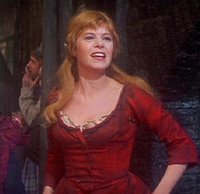Langley Chelmsford held a press conference when he was chosen to design the costumes for Persephone. “I am honored to have been chosen for this most difficult task. In fact, this is the most difficult costuming assignment ever: to create clothes for the inventor of fashion. Persephone’s clothing must be absolutely free of all influences. There can be no Japanese style embroidery or turtleneck collars. Even the very notions of “shirt” or “dress” have to be abandoned."
This choice was extremely controversial, especially in the world of fashion, as Langley Chelmsford was not a fashion designer at all, but a rather infamous poet.
"Only a poet would be able to unlearn enough of history--to ignore enough of influence--to be able to understand what must take place in order to create Persephone's clothes. And only a buffoonish hothead with no regard at all for human decency would be able to do the job correctly," was Oliver Fagin Thomas’s official (and only) statement on the matter.
What really happened that morning will probably never be known. That Langley Chelmsford actually kidnapped Mr. Henry has not been proven, although irrefutable evidence exists that he knew of the Poet Laureate's little known weakness for gin and large-breasted women.
When the master of ceremonies introduced Boggs Henry, and Langley Chelmsford approached the microphone no one suspected a thing. Although some have said they remember thinking he seemed handsome for a poet, no one seemed to think it odd that a member of the ceremonies would chain smoke on stage either. It was not until he actually began to speak that world realized something was amiss:
Heil to the Chief
Let us tear the stars and stripes
And bend the stripes into a swastika
And pin the stars
to those tightwad kikes
those diseased fags
those brainless niggers
those lazy wetbacks
the sluts who kill their babies
and the welfare sluts who don't
and the evil a-rabs
don't forget the retards and the poor
and the kids who can't do chin-ups
Let us shred the constitution
And spread it out on the floor
To soak up the piss and shit
Of the fat southern pigs
Who use the Lord's name in vain.
And while were at it
Let us elect as our Chief a
Syphilitic with one testicle
Who rapes his sister and eats the fetus
Who keeps little boys in a wading pool
And make sure he fiddles.
Who would notice another horse in this senate?
To punctuate the ending, he drop-kicked the microphone into the crowd and thumped off stage. Although the incident was the focus almost the entire world's attention for the rest of the day, the news did not break until the next morning that the author and performer of Heil to the Chief was not Boggs Henry at all and another three days went by before the real poet was located and identified.
Like most things having to do with Langley Chelmsford there are a lot of theories about how he became connected to Oliver Fagin Thomas, and eventually Persephone. It is widely assumed Thomas, like the rest of the world, first heard of
A book, Secret Friendship: Langley Chelmsford and Oliver Fagin Thomas was published around the time the two men were turning sixty. The book has a lot of interesting anecdotes, such as Thomas spent considerable energies trying to cheer Chelmsford out of a severe childhood depression, and that Oliver had shown his friend early drafts of the Persephone. Unfortunately, or perhaps fortunately, the book also puts forth the preposterous notion that a connection of a sexual nature existed between the two, and now no one even remembers who wrote it.



















